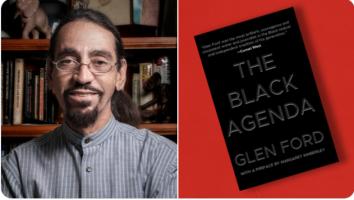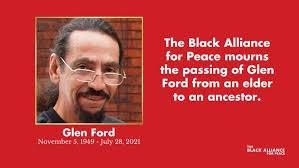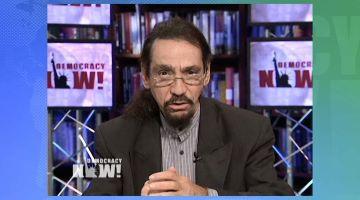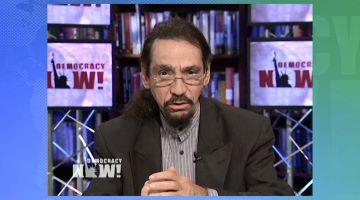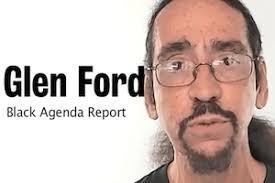Were Glen Ford and T. Thomas Fortune the Same Brother?
Glen Ford followed in the footsteps of another legendary Black journalist.
As the sun set on the 19th Century, and the 20th Century dawned, T. Thomas Fortune fired round after round of journalistic bullets at not only racists, establishment political parties and capitalists, but also at their Black lackeys and bootlickers. The militant journalist edited several “race papers” and established himself as an uncompromising, principled voice of the oppressed.
Fortune came to mind recently when Glen Ford passed away. I’m a Jesus man, and reincarnation has no place in my theology. But if it did, I would likely conclude that T. Thomas Fortune and our new ancestor Glen Ford are one and the same brother. The political and journalistic parallels are uncanny. The two men even look alike.
Like Ford, Fortune was a sworn enemy of both major political parties. We must recall that in Fortune’s time, the Democratic Party was unapologetically racist, and the Republican Party was Lincoln’s party, claiming by default the allegiance of emancipated Africans. However, while Fortune was editor of the New York Globe, he proclaimed that Republicans didn’t care “a snap of the finger” about Africans. Thus, when ownership of the paper changed and the new owner declared that it would be a Republican paper, Fortune was forced out. He began to edit and publish his own paper.
Fortune urged Africans to become independent political actors and to abandon what Ford would later call the “Black misleadership class.” Fortune characterized this group as those who “have swallowed without a grimace every insult to their manhood.”
As we all know, the respective political roles of the two parties later changed and like his predecessor, Glen Ford had no mercy on the new Democratic default party for Black people. He said: “The Democratic Party is a predatory edifice of Black disempowerment, from which our people must either free themselves, or become agents of their own perpetual oppression and accomplices in the degradation of humanity, worldwide.”
Fortune not only shared Ford’s sentiments, but he also acted on them. He founded an all-black organization called the Afro-American League that was independent of the political establishment and sought protection for black voters in the South; the end of lynching; educational equity; eradication of chain gangs and convict leasing; and the end of Jim Crow segregation. Fortune’s objective was for the organization to create “a new man in black … [who] bears no resemblance to a slave, or a coward, or an ignoramus.”
When the Afro-American League ultimately dissolved, it was due in no small part to the efforts of the Black misleaders of the time. If Ford had been around, he would have reminded Fortune about this group. Of them he said: “The Black Misleadership Class has no solidarity with anyone. They are hustlers, who have hijacked the aspirations of a proud, brave and independent-minded people – a people that have historically sought social justice and peace for not only themselves, but all mankind.”
Like Fortune, Ford was not content to merely write about the challenges facing the African World. He was a tireless activist who gave his time and energy to many organizing efforts, most notably the Black is Back Coalition.
Ford was proud of his commitment to socialism. Fortune too had a clear analysis of class. He said the struggle in the south was between “capital and labor, landlord and tenant.” He also explained that white and Black workers shared capitalists as a common enemy and that white workers who shut Black workers out of unions were dupes of the ruling class.
But Ford had the benefit of decades of accumulated collective wisdom and experience that were unavailable to Fortune. Whereas Fortune was not fully on board with Marcus Garvey’s Pan-Africanist program, Ford possessed a highly developed, Africa-centered commitment to internationalism and the ongoing campaign to destroy imperialism. This perspective was thoroughly integrated into his analysis of domestic political matters. He astutely noted:
“Half of the Blacks in Congress voted to continue the bombing and regime change in Libya, an African nation, in the summer of 2011. None of the Caucus has raised serious objections to the U.S.-aided slaughter of more than six million Congolese under Presidents Clinton (Dem.), Bush (Rep.), Obama (Dem.), and Trump (Rep.). The American military occupation of much of the African continent through AFRICOM is a non-issue among the Black misleaders.”
Like Fortune, Ford felt no obligation to heed calls to supposed political pragmatism. He said: “I voted for Jesse Jackson in 1984 and ’88, and for Greens in 2000 and every succeeding presidential year – but never for a corporate Democrat, since that party is the hands-on, most immediate instrument of rich white men’s rule over Black America and a tag-team partner with the GOP in imperialist crimes.”
As we watch right wing dark money find its way into efforts to destroy the so-called progressive wing of the Democratic Party, Black misleaders shine, shuffle and grin for the white establishment. We need the voices of T. Thomas Fortune and Glen Ford to not only call out Black people’s enemies and traitors but to also call for political organizations and strategies that are independent of everyone and everything that lacks an uncompromised commitment to the best interests of Africa’s global community. We hold on to the hope that in the same way that as Fortune left us and Ford picked up his standard, somewhere there is a writer poised and ready to continue in that Black radical journalistic tradition. Until then, we have Glen Ford’s powerful, insightful observations. He said: “Blacks are still at the bottom, and racing deeper into the abyss. But an opportunistic sliver of the Black population has aligned with banksters and oligarchs in Democratic boardrooms. They join with corporate Democrats in screaming that Trump is the existential threat – not U.S. imperial wars, in which most Democrats are complicit; not the Race to the Bottom, which is as much a Democrat as Republican project; not the Mass Black Incarceration State, which is mainly enforced by urban Democratic regimes of all colors; and not capitalism, a system that was born, like the white settler United States, itself, in Native genocide and Black chattel slavery… [Black] people [need] a new party, with themselves in the leadership, a party that will Fight the Power. There is a world of allies out there, sharing the same aspirations. But none can be free of the scourge of war – the ultimate crime against humanity, from which all others flow – while the warmakers are in power in the Citadel of Capital. The key to unlock all of our chains is right here, in the belly of the beast. Power to the People!”
Indeed. Rest in power Brother Glen.
Mark P. Fancher is an attorney and writer who feels highly honored to have contributed articles to the first and last editions of Black Agenda Report edited by Glen Ford, as well as to many editions in between. He can be contacted at mfancher[at]comcast.net.

